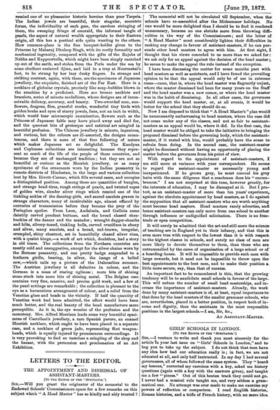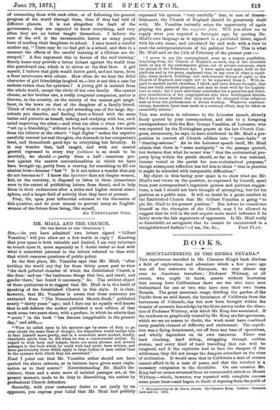GIRLS' SCHOOLS IN LONDON.
[TO THE EDITOR OF THE "SPECTATOR.]
Srrt,—I venture to write and thank you most sincerely for the' article tn your last issue on "Girls' Schools in London," and to- beg you to take up the subject. I do not think that men have any idea how bad our education really is ; in fact, we are not educated at all, and only half instructed. In my day I had several governesses, all of whom followed the same system. They "hears my lessons," corrected my exercises with a key, asked me history questions (again with a key with the answers given), and taught. me a few "pieces." Out of this beaten track they could not go
I never had a musical rule taught me, and very seldom a gram- matical one. No attempt was ever made to make me exercise my powers of reflection or comparison. I read English histories, Roman histories, and a trifle of French history, with no more idea.
of connecting them with each other, or of following the general progress of the world through them, than if they had told of
different planets. It is not altogether the fault of the governesses; they are expected to know everything, and very often they are no better taught themselves. I believe the root of the evil is the unreasonable horror so many people have of sending their daughters to school. I once heard a careful mother say, "There may be one bad girl in a school, and then in a moment the effects of the careful training of a lifetime are de- stroyed." A fine argument this in favour of the said training ! Surely home may provide a better helmet against the world than this pasteboard one, which is to shiver at the first blow. A girl myself, I believe that girls would derive good, and not harm, from a freer intercourse with others. How often do we hear the fitful character of girl friendships laughed at,—but is not this a case for sadness rather than for cynicism? A young girl is isolated from the whole world, except the circle of her own family. She cannot choose, as her brother can, a really congenial companion, and so is thrown, in the country, on the society of the nearest girl neigh- bour, in the town on that of the daughter of a family friend. Think of what it might be to a girl attending one of the large day- schools you describe, and finding there a friend with the same tastes and pursuits as herself, talking and studying with her, each mind improving the other,—and what too often is when two girls "set up a friendship," without a feeling in common. A few sneers from the inferior at the other's "high flights" makes the superior carefully conceal her real thoughts, she descends to her companion's level, and thenceforth good-bye to everything but frivolity. Is it any wonder that, half taught, and with our mental growth repressed in every way (oddness is so much to be avoided), we should — partly from a half - conscious pro- test against the narrow conventionalities in which we have been brought up, partly from a craving for something to fill our aimless lives—become "fast "? Is it not rather a wonder that any do not become so ? I know the Spectator does not despise women, but, on the contrary, is disposed to listen to them (sometimes even to the extent of publishing letters from them), and to help them in their endeavours after a wider and higher mental atmo- sphere, and a larger field of activity than they have at present.
Pray, Sir, open your influential columns to the discussion of this question, and do your utmost to prevent many an English- woman of the future from being, like myself, As UNEDUCATED GIRL.



































 Previous page
Previous page